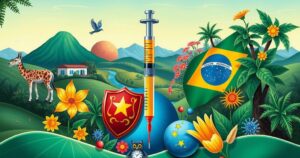Concerns Rise as USAID Cuts Threaten Vital Aid in South Sudan

Dr. Jack Hickel, president of the Alaska Health Project South Sudan, expresses concern over significant cuts to USAID funding, which jeopardize vital development work, particularly in providing fresh water and food security in South Sudan. He highlights the dire conditions exacerbated by an influx of refugees and stresses the need for Alaskans to advocate for restored funding to prevent potential famine and increased mortality rates among children.
Dr. Jack Hickel, president of the Alaska Health Project South Sudan, expresses grave concerns regarding the impending repercussions of federal government decisions to administer cuts to USAID programs, particularly affecting South Sudan. This nonprofit organization plays a crucial role in providing essential services such as fresh drinking water and food security in one of the most impoverished nations.
Hickel highlights that despite some advancements, the region remains impoverished, lacking basic infrastructure such as roads, electricity, sanitation, and running water. Since its inception in 2008, the Alaska Health Project South Sudan has aided approximately 100,000 people by drilling over 107 wells and enhancing food security.
The organization primarily receives funding from Alaskan residents but is dependent on partner organizations reliant on USAID. Amidst federal cost-cutting measures, the Trump administration plans to reduce the size of USAID significantly, resulting in 1,600 U.S. employees losing their jobs. Hickel stresses that such funding cuts will limit their ability to drill wells and exacerbate the already critical conditions in South Sudan, particularly due to a surge of over a million refugees from neighboring Sudan.
Funding reductions are likely to lead to disastrous outcomes, including famine and increased mortality rates as resources for vital necessities such as food, medicine, and vaccines diminish. Hickel warns that disruptions in vaccine distributions will pose life-threatening risks to children in the region. He urges Alaskans to engage with their elected officials to advocate for the restoration of USAID funding.
Additionally, the Alaska Health Project South Sudan is seeking donations to expand its operations in the region, aiming to reach more individuals in dire need of assistance.
Overall, the situation presents a significant humanitarian crisis that requires urgent attention to prevent catastrophic outcomes in South Sudan.
In light of the serious funding cuts to USAID, the Alaska Health Project South Sudan faces potential severe setbacks in addressing the critical needs of vulnerable populations in South Sudan. Dr. Jack Hickel’s call for community engagement underscores the importance of advocacy for restored funding to ensure the continuation of life-saving programs and the expansion of support for the growing number of individuals in need. Immediate action is essential to avert a humanitarian disaster that could lead to famine and increased child mortality.
Original Source: www.alaskasnewssource.com








